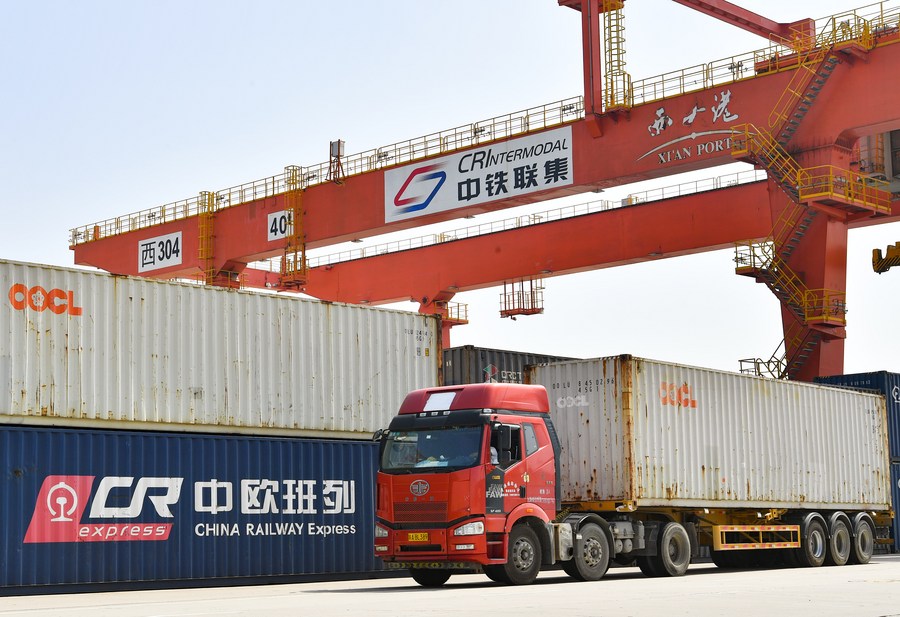
A live-streamer promotes lingzhi mushrooms in Guanxian County of Liaocheng City in east China's Shandong Province, July 9, 2022. (Xinhua/Guo Xulei)
BEIJING, Oct. 29 (Xinhua) -- For Muhammad Hasan Makhdomzada, perhaps the best way to comprehend China is by experiencing its villages, after the Afghan student visited a photovoltaic power station in the countryside, explored fruit and vegetable plantations, and tasted wine produced on a farm in his quest to understand China better.
Makhdomzada who came to China seven years ago is a business administration student at the Hefei University of Technology. He has traveled to many rural areas of east China's Anhui Province in an attempt to understand how technology and industries are transforming the lives of farmers.
"In every village that we visited, local residents praised the achievements of the Communist Party of China (CPC) in leading the people out of poverty and towards prosperity," he said, adding that his own country can learn from China's successful experience in poverty eradication.
Makhdomzada has been amazed by China's success in fighting poverty, which saw close to 100 million rural residents shake off destitution in the past decade. China declared victory against absolute poverty and the completion of building a moderately prosperous society in all respects in 2021.
During the past decade, China's GDP more than doubled to 114 trillion yuan (about 15.9 trillion U.S. dollars), and its population of 1.4 billion has enjoyed the fruits of economic growth. The world's second-largest economy has pursued a more proactive strategy of opening up, becoming a major destination for global investment and a leading country in outbound investment.
At the 20th CPC National Congress held from Oct. 16 to 22, the Party mapped out a course for Chinese modernization over the next five years and beyond, which would attract more foreigners to the country.

A cotton picker works in a field in northwest China's Xinjiang Uygur Autonomous Region, Oct. 13, 2022. The cotton harvest season started in October in Xinjiang, the largest cotton-growing area in China. (Photo by Wang Yawen/Xinhua)
PEOPLE-CENTERED DEVELOPMENT
Ray Woodard, who hails from the United States and works as an English language teacher in the northern Chinese city of Taiyuan, said he is impressed by China's long-term planning.
In its two-step strategic plan, the CPC aims to basically realize socialist modernization from 2020 through 2035, and build China into a great modern socialist country that is prosperous, strong, democratic, culturally advanced, harmonious and beautiful from 2035 through the middle of this century.
"I think the people-centered strategy is what is lacking in some nations at this time so I wholeheartedly agree with the sentiments and plan that the CPC has laid out," Woodard said.
China's targeted epidemic control measures are indicative of the idea that protecting life is the priority, and they are the realistic practice of the principle of putting the people first, he said.
MD Tanbir Hassan, a Bangladeshi doctorate student at the Hefei University of Technology, said he was inspired by China's people-centered development philosophy.
"The CPC has always put the people first. They are not only helping improve people's living standards but also creating a harmonious living environment for them," Tanbir Hassan said.
Hansen Nico Rene, a retiree from Luxembourg who now lives in south China's Guangxi Zhuang Autonomous Region, once had a direct experience of the people-centered philosophy when he volunteered in a poverty alleviation campaign in Zhadong Village in Hechi City between 2018 and 2021.
Rene recalled that during the poverty alleviation drive, local CPC cadres always kept in mind the residents' demands, assisting many locals in relocating and beginning a new life with new occupations.
Nik Gu, a Russian student from Tsinghua University in Beijing, said he is particularly interested in China's whole-process people's democracy. In August, Nik Gu visited a residential community in downtown Beijing and witnessed the process of this unique governance mechanism and its results.
The elders living in the neighborhood had problems with the public toilets as the facilities were far away. After a meeting with residents, the community built a new public toilet soon so that the elders and other locals won't experience any discomfort during cold seasons, he told a story of the community's democratic practice.
He added that China's whole-process people's democracy will help the country's modernization drive.

A truck transports containers at Xi'an International Port in Xi'an, northwest China's Shaanxi Province, July 29, 2022. At present, Xi'an has 16 main freight train routes to Europe, passing through 45 countries and regions along the Belt and Road. (Xinhua/Zhang Bowen)
MUTUALLY BENEFICIAL OPENING-UP
"I expect China to continue to adhere to the policy of opening up, accelerate the building of a new development paradigm and promote high-quality development and high-level opening up. The Chinese dream is also my dream," said Simon Lichtenberg, founder and CEO of Trayton Group, a furniture manufacturer based in Shanghai.
The Danish businessman, who first came to Shanghai in 1987, has witnessed rapid economic development and improvement in the business environment over the past decades.
China is committed to its fundamental national policy of opening to the outside world and pursues a mutually beneficial strategy of opening up. It strives to create new opportunities for the world with its own development and to contribute its share to building an open global economy that delivers greater benefits to all peoples, according to the Report to the 20th CPC National Congress.
Esteban Zottele, an Argentine who teaches Spanish at Changzhou University in east China's Jiangsu Province, pays attention to the Belt and Road Initiative (BRI).
China adheres to the right direction of economic globalization, jointly cultivates new drivers of global development and upholds true multilateralism, according to Zottele.
Last year, China continued to be the second-largest trading partner of Latin America, with the bilateral trade volume reaching a new high. Earlier this year, China and Argentina signed a Memorandum of Understanding on the Belt and Road Initiative.
As a collaborative endeavor, the BRI has been welcomed by the international community both as a public good and a cooperation platform. China has signed BRI cooperation documents with 149 countries and 32 international organizations.
"The Belt and Road Initiative is a massive project. I believe it will be successful," said David Ferguson, the honorary chief English editor of Foreign Languages Press in Beijing.
The initiative will continue to provide massive opportunities for development stretching along the whole area of the Belt and Road. And that fits in very well with China's commitment to promoting a global community of shared future, Ferguson added.Ёі









